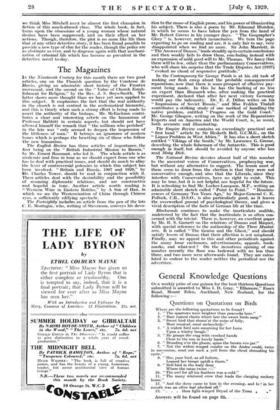The Magazines
IN the Nineteenth Century for this month there are two good articles, one on the Flemish question by the Comtesse de Meeils, giving an admirable short history of the Frontist movement, and the second on the "Value of Church Estab- lishment for Religion," by the Rev. J. S. Boys-Smith. The -latter shows more thought than we have yet seen applied to • this subject. It emphasizes the fact that the real authority -in the church is not centred in the ecclesiastical hierarchy, and this is timely when such a strong effort is being made to assert the authority of the bishops. Mr. McEachran contri- butes a clear and interesting article on the humanism of 'Professor Babbitt in certain aspects, but should not have -allowed himself the remark that "the millions who perished" in. the late war "only seemed to deepen the impression of the littleness of man.'" It betrays an ignorance of modern 'issues which is perhaps the besetting sin of those who follow the new humanism.
The English Review has three articles of importance, the first being on the "British Industrial Mission to Russia," -by Mr. Ernest Remnant, who led it. The whole article is as moderate and firm in tone as we should expect from one who has to deal with practical issues, and should do much to allay the fever of controversial polemics in which this subject has been involved. "Britain and Russia, 1907 and 1929," by
• Mr. Charles Tower, should be read in conjunction with it. These articles deal with the desirability and the possibility of resuming diplomatic relations, and are constructive and hopeful in tone. Another article worth reading is "Western Wine in Eastern Bottles," by A Son of Han, in which we see the Westernization of China through Chinese eyes, a sufficiently edifying spectacle.
The Fortnightly includes an article from the pen of the late C. E. Montague, who, writing of Stevenson, conveys his devo- ,tion to the causeof English. prose, and his-power of illuminating his subject. There is also a poem by Mr. Edmund Blaziden, in which he seems to have taken the pen from the hand of Mr. Robert Graves in his younger days. "The Geographer's Glory" is, however, rather inconclusive. We turn the page expecting to go on reading and are, it is only fair to say, very disappointed when we find no more. Sir John Marriott, in "The Answer of Demos," leads steadily up to certain conclusions and then weakly fails to draw them, concluding instead with an expression of mild good will to Mr. Thomas. We fancy that there will be few, other than the parliamentary Conservatives, who will share his surprise that the Trade Disputes Act (1927) "evoked no chord of responsive gratitude."
In the Contemporary Sir George Paish is at his old task of making our flesh creep about the probable consequences of reparations, now that there is some prospect of effective pay- ment being made. In this he has the hacking of no less an expert than Bismarck who, after making the practical experiment, declared that after her next victory Germany would pay the indemnity. Dr. E. J.. Dillon writes on his "Impressions of Soviet Russia," and Miss Fecklen Tindall contributes a striking study of one method of handling the native problem, entitled Progress on the Gold Coast." Mr. Georg-e Glasgow, writing on the work of the Reparations Experts and on America and the World Court, is, as usual, both accurate and illuminating.
The Empire Review contains an exceedingly practical and ." first hand" article by Sir Hesketh Bell, G.C.M.G., on the "Liquor Problem in West Africa." It has also a short sketch entitled "Vikings of the South," by Mr. LaWrence G. Greene, describing the whale fishermen of the Antarctic. This is good enough in itself, but should be avoided by anyone who has read Moby Dick.
The National Review devotes almost half of this number to the ancestral voices of Conservatives, prophesying woe, but without any alternative to suggest. The lesson most of them seem to draw from the election is that they were not conservative enough, and also that the Liberals, since they interfere with Conservatives, have no right to -exist. This may be true, but it is not helpful, nor hopeful for the future. It is refreshing to find Mr. Locker-Lampson, M.P., writing an admirable short sketch called " Point to Point." " Reminis- cences of Germany Ten Years Ago," by Major-General C. E. Pollock, C.B. D.S.O., is also particularly good, as it leaves the overworked ground of psychological theory, and gives a vivid description of the facts of German life at the time.
Blackwoods continues to make the inarticulate audible, undeterred by the fact that the inarticulate is so often con- cerned with the trivial. There is, however, an excellent paper by Mr. R. S. Garnett on the relations of Dumas and Magnet, with special reference to the authorship of the Three Musket- eers. It is called "The Genius and the Ghost," and should
• satisfy lovers of Dumas that their affection is not misplaced. -Finally, may, we appeal to this and other periodicals against the many loose enclosures, advertisements, appeals, book- marks, and what-not ? On the incautious opening of one number recently the floor was bedewed with no less than three, and two more were afterwards found. They are calcu- lated to endear to the reader neither the periodicaF nor the advertiser.










































 Previous page
Previous page